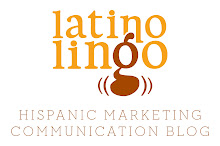Bogota (New Jersey, not Colombia) Mayor Steve Lonegan is offended that McDonald's has put up a Spanish language billboard to promote its iced-coffee to the area's growing Hispanic population. (According to the article, 21% of the residents are Latino)
According to the mayor in an
article in The Record ,the billboard is offensive because, it
sends the message that Spanish speakers and immigrants do not need to learn how to speak English.
He is quoted as saying, "This billboard says, 'You Hispanics can't learn English, so we're going to put up this sign.' It's really sending the wrong message."
He's not the only one upset. Carmen Morales, from "You Don't Speak for Me," a group that opposes illegal immigration says in the article. "I believe that McDonald's should be ashamed of themselves, assuming that Hispanics don't speak English ... I feel this is an insult to the Hispanic community. We the Hispanics know what a "Big Mac" is and we certainly CAN read English."
Well, I'm glad "You Don't Speak for Me" doesn't speak for
me because I know my relatives who have immigrated to the U.S. from a mountain town in Colombia didn't know a Big Mac from a Whopper until they got here.
What bugs me most about this sentiment (and the cheesesteak guy in Philadelphia who put up an "English Only" sign) is that it assumes Hispanics come here and purposely don't want to learn English.
With Hispanic immigration booming, it's safe to assume -- like our European immigrant counterparts who came through Ellis Island -- that Hispanics don't necessarily arrive in the U.S. with a command of the English language ... or know that a Big Mac is composed of (
sing along with me if you know the song) two all-beef patties, special sauce, lettuce, cheese, pickles, onions on a sesame seed bun.
We forget about European immigration in the early 1900s and how European immigrants also settled into ethnic communities where initially they spoke their native language. The Irish communities, Polish communities, German communities and Italian communities to name a few were ethnic-centers of culture, arts, food, music, etc.
We too naturally settle into communities where we are with our own and where we can survive by speaking our native languages until we learn English. So, how about giving us a chance to do so before saying we can't order something in Spanish? And, until we do, does it not make sense to allow us to contribute to the economy and buy an iced coffee from McDonalds?
I hope the good mayor doesn't ever drive through Chinatown by mistake, if he's offended by an iced coffee billboard, what would be think of all their signage and billboards in the many Chinese dialects?

